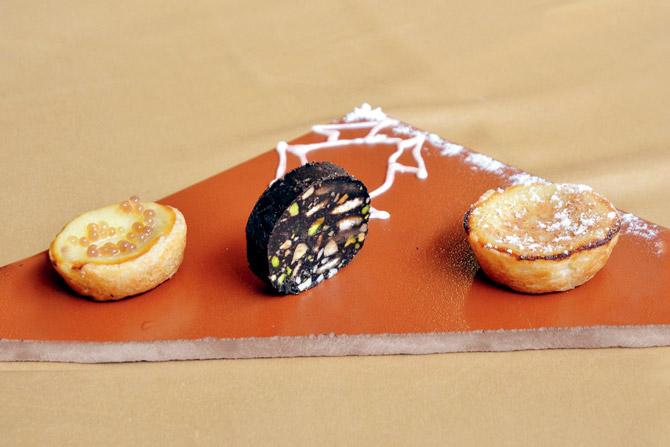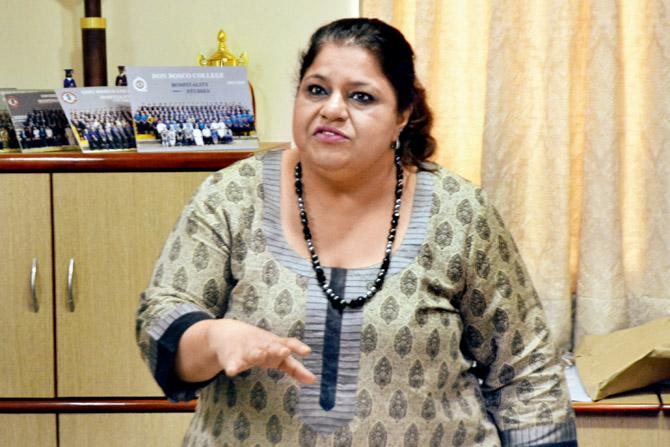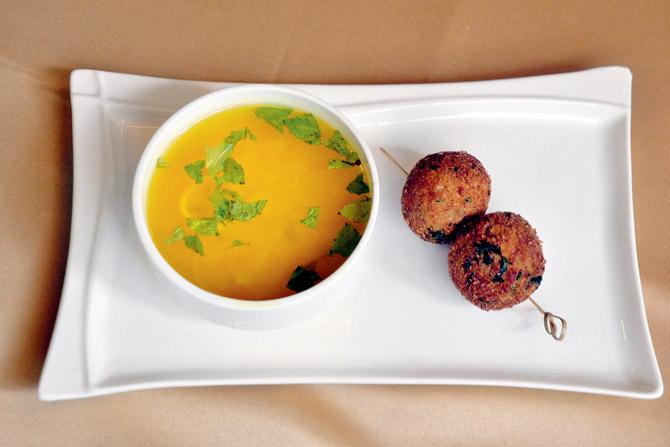A hospitality school's food fest offers you Portuguese grub that is far-removed from the version we get in India

Students prepare bolhinos. Pics/Datta Kumbhar
There is a place called Belem in the outskirts of Lisbon where, in the early 19th century, a thriving monastery cast its sphere of influence on the local populace. But that changed in 1820. The liberal revolution of that year posed a direct challenge to the clergy, meaning that by 1834, all the monasteries in the country were shut down. As a consequence, their inhabitants suddenly found themselves unemployed. So to make ends meet, an enterprising person from the monastery at Belem decided to commercialise the signature pastries made there, thanks to a sugar refinery nearby. Word spread. People from far and wide came to the shop which sold the sweet dish just to sample its unique recipe, a closely-guarded secret that survives to this day. And that's how the "Belem tart" became Lisbon's most famous culinary legacy, one which, it can be safely said, isn't found anywhere else in the world.
ADVERTISEMENT

Pastel de nata and chocolate morcela
The point of this story is to highlight how — given the massive influence that Portuguese colonisers have had on Indian cuisine — our view of the Iberian country's indigenous food culture can often be restricted due to our own historical context. Anyone who thinks that the Rosary sausages in Goa are akin to the chorizo found in Portugal might well believe that the "Chinese" dishes in Mumbai's lunch homes are also found in Sichuan. But that, of course, isn't the case. And a school of hospitality in the city is now hosting a festival that aims to correct misconceptions, serving up authentic Portuguese recipes so that Mumbaikars get a taste of the Iberian Peninsula.
Spicing things up
Annabelle Rodrigues, principal, Don Bosco College Hospitality Studies, explains the difference. "What happened is that the Portuguese invaders reused a lot of the spices that were already prevalent here, but in a different manner. They took the Goan food that was extremely spicy and made it slightly sweeter and more palatable to suit their own tastes [thanks largely to the addition of tomatoes, a fruit they introduced to India]. That was the birth of what we now know as Goan-Portuguese cuisine. But it's nothing like what you get back in Portugal. So if you go to a restaurant like O Pedro and then come to our festival, you might say, 'Wait, this is not Portuguese food at all,'" she tells us.
 Annabelle Rodrigues
Annabelle Rodrigues
What she means is that the BKC restaurant wouldn't have an item called caldo verde on its menu. It's a simple, yet iconic, soup that's served throughout the year in Portugal. "Everybody there has it. But our idea was, 'Why do something that people already know about?' So, we are making canja instead. It's another kind of soup that isn't as famous. And if you translate it, it's like the Indian kanji, which is a sort of rice gruel. But it's not that we are doing away with caldo verde altogether, because the rice that the main course will be served with is boiled in a caldo verde broth."
 Canja and bolhinos
Canja and bolhinos
A sweet ending
She adds that this main course will also include a chorizo that the students have made in-house, using a combination of chicken, buffalo meat and pork mince mixed with Portuguese spices. The list of dishes also has a fish cake called bolhinos, typically made with cod. Rodrigues says, "Since the country has an expansive coastline, their menu has a lot of seafood, the most famous of which is cod. But we have made a version using tuna, since you don't get cod in India."
The desserts, meanwhile, include chocolate morcela, made with blood sausages, and Porto pudin flan, which has a base of chocolate spiked with port wine. And crucially, there is also pastel de nata, a version of the Belem tart that has become popular around the world, considering that the original is found in one place only, and for which you'd have to book a flight to Lisbon.
ON Today, 12 pm AT Don Bosco College Hospitality Studies, Kurla West
CALL 7208584591
ENTRY FEE Rs 351
Catch up on all the latest Crime, National, International and Hatke news here. Also download the new mid-day Android and iOS apps to get latest updates
 Subscribe today by clicking the link and stay updated with the latest news!" Click here!
Subscribe today by clicking the link and stay updated with the latest news!" Click here!







